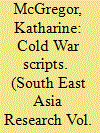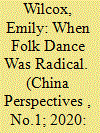| Srl | Item |
| 1 |
ID:
146535


|
|
|
|
|
| Summary/Abstract |
This paper contributes to a growing field of literature on Cold War culture by comparing struggles over memory in Indonesia and Malaysia of anti-communist repressions. It demonstrates the enduring legacies of the Cold War in these neighbouring countries where the war overlapped directly with experiences of colonization and decolonization. I show how and why anti-communism in both countries became a core foundation of both Malaysian and Indonesian nationalism and related religious identification and how this largely explains successive governments’ attempts to memorialize and defend these repressions. I argue that recent attempts by both survivors of the repression and younger Indonesians and Malaysians to reexamine the history of the political left or experiences of repression constitute important efforts to rethink the postcolonial predicaments of both countries in different ways.
|
|
|
|
|
|
|
|
|
|
|
|
|
|
|
|
| 2 |
ID:
180037


|
|
|
|
|
| Summary/Abstract |
The Bulgarian decision to deport 250,000 Bulgarian Turks to Turkey in August 1950 came as a shock to the Democratic Party (DP). As a party that had taken power only three months ago, the DP was not prepared to accept the influx of thousands of immigrants. The deportation initially challenged the DP’s legitimacy at home and abroad because the DP tried to exercise its political hegemony over the opposition and to become a member of the North Atlantic Treaty Organization (NATO). To counter criticism in Turkey and to protect its image in the international arena, the DP formulated a set of policies, ranging from diplomatic channels to anti-communist discourses and victimization of immigrant children and women. Based on primary and secondary accounts, the article argues that the deportation of Bulgarian Turks was a challenge – and simultaneously a source of legitimacy – to the DP at the beginning of its rule.
|
|
|
|
|
|
|
|
|
|
|
|
|
|
|
|
| 3 |
ID:
184165


|
|
|
|
|
| Summary/Abstract |
This article examines the political structure of political violence in Turkey in the 1970s, focusing on the internal structures of the Nationalist Movement. The paper argues that the Movement was able to draw on its high degree of coordination and centralisation to organise violent actions. The first section analyses how the Nationalist Movement was structured. The second section analyses a determined effort by the Movement to promote the model of a disciplined militant. The third section analyses how the Movement mobilised these organisational and militant resources in the violence it employed to entrench its position up until the 1980 coup.
|
|
|
|
|
|
|
|
|
|
|
|
|
|
|
|
| 4 |
ID:
097871


|
|
|
|
|
| Publication |
2010.
|
| Summary/Abstract |
This paper discusses the origins and the implementation of the New Life Movement (NLM) in the Jiangxi Province between 1934 and 1938. Based upon primary sources produced during this period, it explores how the Nationalist Party utilised the NLM for the purposes of national reconstruction and social mobilisation. The first section analyses how elements of anti-communism, Christianity and state Confucianism came into play in the NLM; the second section analyses how the Nationalists reinforced the idea of 'hygienic modernity' by projecting it into the realms of state building and mass mobilisation; the third section discusses the changes introduced in society by the Nationalists with the creation of semi-governmental organisations; and the fourth section examines the involvement of the NLM with preparation for the war against Japan (1937-1945). The paper argues that the NLM had a lasting impact on Chinese society, and it contributed to shape citizenship and national identity.
|
|
|
|
|
|
|
|
|
|
|
|
|
|
|
|
| 5 |
ID:
172997


|
|
|
|
|
| Summary/Abstract |
This article challenges three common assumptions about Chinese socialist-era dance culture: first, that Mao-era dance rarely circulated internationally and was disconnected from international dance trends; second, that the yangge movement lost momentum in the early years of the People’s Republic of China (PRC); and, third, that the political significance of socialist dance lies in content rather than form. This essay looks at the transformation of wartime yangge into PRC folk dance during the 1950s and 1960s and traces the international circulation of these new dance styles in two contexts: the World Festivals of Youth and Students in Eastern Europe, and the schools, unions, and clan associations of overseas Chinese communities in Hong Kong, Singapore, Malaysia, and San Francisco. By tracing the emergence and circulation of yangge and PRC folk dance, I propose the existence of “Cold War yangge” – a transnational phenomenon in which Chinese folk dance became a site of leftist political activism.
|
|
|
|
|
|
|
|
|
|
|
|
|
|
|
|